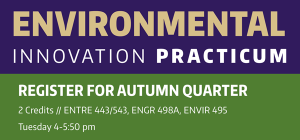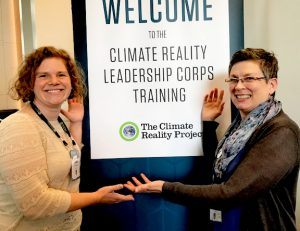Creating Change: The Environmental Innovation Practicum
Environmental Innovation Practicum instructor Deb Hagen-Lukens taught Entrepreneurial Marketing for 10 years at UW following two decades of consulting, investing, and mentoring clean tech, consumer product, and high-tech startups. Deb authored the following guest blog for the Buerk Center for Entrepreneurship (Read last year’s blog here). You can learn more about the ENTRE 443/543, ENGR 498A, ENVIR 495 practicum course and other ways to prepare for the Environmental Innovation Challenge on the Buerk Center’s webpage, or by e-mailing Cassie Maylor at [email protected].
A friend and I joked across social media last month that we’d both started a new hobby—checking Seattle’s air quality index daily. We dealt with bad air last summer as well, but this August’s smoke hung around longer, occurred more frequently, and was much harder on our lungs. News articles quoted our own UW professors suggesting we may have to get used to this as a new normal.
I see this as an opportunity for students to take action in the Environmental Innovation Practicum.
I think it would be far better to work toward a very different “new normal”—one with renewable energy, sustainable food systems, healthy air, clean water and endless waste reduction. That’s the “new normal” the Practicum explores.
 The whole idea of this Practicum is to give student engineers, scientists, and marketers experience working together with public policy wonks, accountants, and product designers to address a problem for the Earth while solving a problem for a set of paying customers. I believe these solutions can make a true difference in the environment. If we fail to address a real problem with a real solution, we will have no environmental impact. Fail to address a market need and you have no business. All the pieces need to fit.
The whole idea of this Practicum is to give student engineers, scientists, and marketers experience working together with public policy wonks, accountants, and product designers to address a problem for the Earth while solving a problem for a set of paying customers. I believe these solutions can make a true difference in the environment. If we fail to address a real problem with a real solution, we will have no environmental impact. Fail to address a market need and you have no business. All the pieces need to fit.
Clean energy is making strong inroads all over the world as adoption of wind and solar accelerates faster than expectations and costs drop with increased production efficiencies. An August 30 New York Times feature on Orlando’s push for carbon-free energy eloquently recapped some of our energy challenges while showcasing a breadth of potential alternatives to fossil fuels.
Every week, we see great news of progress in many sectors. Still, our pace of transition to a clean energy economy globally has to accelerate to address our shared global challenge. But as is often the case, great problems create great opportunity for inventors and entrepreneurs. The possibilities for new product and service companies might leap quickest to mind, but there are also opportunities to develop entirely new business models for a wide variety of industry sectors.
Part speaker series, part project, this fall’s Practicum will cover innovating our energy systems, growing and packaging food sustainably, changing our approach to building, using waste products as the raw material for new creations and even how gamification can help change human behavior.
Experts from across UW and the region will join us this quarter including Architect and Structural Engineer Kate Simonen, Founder of the Carbon Leadership Forum; EarthGames’ Atmospheric Sciences Prof. Dargan Frierson; and Engineering Professors Daniel Kirschen, Christine Luscombe and J. Devin MacKenzie will brief the class on grid energy, solar progress and the advanced manufacturing techniques required to scale renewable alternatives.
Brent Kawamura, the PCC Community Markets’ sustainability special leading the drive to convert all 5 million packages in a PCC store to compostable containers, and King County Food: Too Good to Waste Program Manager Karen May will join Skyroot Farm Co-owner Elizabeth Wheat, lecturer in UW’s Program on the Environment, to talk about Food and Consumption.
Speaker sessions will be open only to enrolled students. Once student teams are formed mid-quarter, each class period will also include coaching sessions with experienced entrepreneurs and mentors circulating through the teams to answer questions and help advance project concepts toward the final presentations at the end of the quarter.
While public policy plays an undeniable role in addressing pollution and nurturing new industries, I believe entrepreneurs can have enormous impacts in shaping a future that looks markedly different from our present reliance on fossil fuels, propensity to design buildings that deny geography, dependence on mono crop agriculture that defies growing zones, along with so many other inefficiencies.
Practicum teams have developed ideas to make jersey barriers for roadways from recycled tires, biodegradable agricultural plastic to protect delicate crops from early frosts from a food waste and designer rain coats from ocean plastic, to name a few. I can’t wait to see what they come up with this year.

